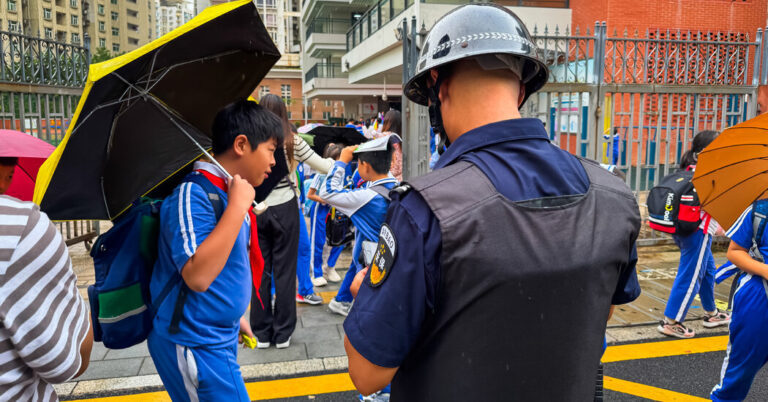The Chinese government is stepping up measures to root out potential troublemakers and curb social discontent, as a spate of mass murders has shaken the country and raised concerns about security.
Armed police have been stationed outside the school, and bollards have been erected nearby to prevent cars from hitting people. Police promised to increase patrols in supermarkets, tourist spots and other crowded places, and to tighten regulations on knives and other weapons. Officials also promised to help the unemployed and distribute vacation subsidies to the poor.
The security boost, dubbed “winter operations” by some regional officials, follows a series of recent attacks that have drawn renewed attention to China’s struggling economy. In November, a driver plowed into a crowd outside a sports center in Zhuhai, killing at least 35 people in China’s worst attack in a decade. Just a week later, a stabbing that left eight people dead and another car crash outside the school occurred. Officials said that in all three cases, the perpetrators were venting their financial grievances.
After the attack in Zhuhai, Chinese leader Xi Jinping ordered authorities to “strictly prevent extreme situations.” Authorities at all levels are rushing to comply.
The drivers involved in the two car attacks were sentenced to death late last month in an unusually quick trial, demonstrating the government’s determination to crack down on potential copycat perpetrators.
Providing stability and control has long been one of the ruling Chinese Communist Party’s top concerns and an implicit justification for restricting people’s civil liberties. But high youth unemployment, a surge in foreclosures and deteriorating international relations have fueled widespread anxiety about China’s future, making those concerns even more central. As local government finances slump, some civil servants are not paid.
Public protests, primarily related to economic issues such as investment losses and unpaid wages, increased by 18% in the first 11 months of 2024 compared to the previous year, according to a tracker by Freedom House, a Washington-based advocacy group. % increase.
However, the Chinese government remains reluctant to strengthen domestic social safety nets or provide significant direct relief to consumers. Instead, it has resorted to more heavy-handed tactics to root out disaffected people.
The central government has called on authorities to ensure social stability during the holiday season, saying in a Dec. 27 notification that they should “conduct dragnet investigations into all types of conflicts and hidden risks and dangers.” Ta.
Police in the northwestern Chinese city of Yinchuan investigated whether there had been bullying or disputes between faculty, staff or students, according to a news release.
In eastern China’s Yancheng city, police searched karaoke bars, rental homes and hotels for possible sleeping victims.
At a recent meeting of villagers and local party leaders in central Henan province, police “encouraged everyone to actively report any disputes or disputes that have recently occurred in their villages.” Under Mr. Xi’s leadership, the Chinese government has once again called on ordinary citizens to monitor each other.
The central government regularly issues guidance to ensure a safe holiday season. But this year, the instructions regarding social stability have become more detailed. They identified venues to monitor, such as campuses and sports venues, and called on authorities to monitor public opinion and provide “positive guidance.”
Discussion of the attacks, and of economic grievances in general, is heavily censored. Relatives of the victims have also been prevented from speaking to journalists.
Economists and commentators have suggested that the government should focus more on boosting consumer confidence and providing greater protection for ordinary people from economic hardship. Authorities have sometimes granted such demands, such as to address wage arrears among migrant workers and provide holiday pay to the homeless and disabled.
Discussion on social media revealed that many civil servants across the country received surprise pay increases this month, although the government did not make an official announcement.
However, many calls for more substantive reforms have themselves been seen as a threat to social stability and have been censored.
Li Chengpeng, a former prominent Chinese journalist who now lives abroad, said, “They should have investigated what forces turned these people into beasts, but instead they investigated ‘five types of losers.’ I ran away to do something,” he wrote on social media. He was referring to a local government notice distributed online instructing authorities to monitor people who have suffered losses in jobs, investments, etc.
Still, the same economic downturn that may be fueling dissatisfaction among some people could also make it difficult to maintain enhanced safety measures.
Many local governments are already in debt. The Chinese government is currently under intense pressure to heed Mr. Xi’s calls to prevent large-scale incidents, but Hongsheng Zhu, an assistant professor at Hong Kong’s Lingnan University who studies Chinese governance, said the Chinese government is currently under intense pressure to respond to Mr. Xi’s calls to prevent large-scale incidents. said that it would soon become tighter.
“Unless there are new incidents, security will be a lower priority for local governments until the next public outcry,” he said.


